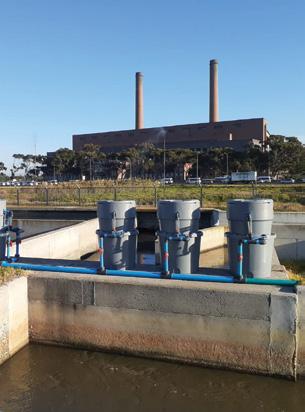
2 minute read
TDEAL WITH WATER DIFFERENTLY

The Deputy Minister of the Department of Water and Sanitation, Judith Tshabalala gave a keynote speech at the National Siltation Management Short Learning Programmes launch event.
he deputy minister spoke broadly about the current state of water and sanitation in South Africa where her rallying cry was that as water professionals, bodies, and regulators, “we need to deal with water differently.”
South Africa faces many challenges concerning water, something the deputy minister does not shy away from. “Our people are frustrated with our infrastructure, our population has grown and we are dealing with old dams, broken pipes. We need to address these concerns but we also have to deal with outside factors such as vandalism.”
On a municipal level, she notes that “Municipalities are underperforming, and not using the allocated budget effectively.” What the country is seeing now are municipalities that are “financially frustrated” due to years of mismanagement, and municipalities that are “incapable of delivering on water and sanitation expectations.”
To this effect, Deputy Minister Tshabalala mentions the National Water Resource Infrastructure Agency (NWRIA) bill that would allow national intervention into local municipalities if they are non-compliant or failing to meet their mandates.
Addressing broader concerns she highlights that the most important people in the country’s water and sanitation sector are the customers.
Noting that “people want to pay for good services and usually have no problem when the water they receive is of good quality and billed correctly.”
Having the end user in mind is the key to finding solutions.
She adds that water and sanitation are supposed to be self-sufficient and “relying on the national government to subsidise everything is not the answer.”
On this, she elaborates, “ This is where the NWRIA can help by bringing in the private sector to help us with funding and capacity”.
Migration and transboundary agreements
Migration is another hot topic in South Africa and the deputy minister takes the chance to remind us that “rivers don't know borders” and reflects on an earlier project this year where transboundary agreements benefit people from either side of the border. In a landmark water-sharing agreement between Zimbabwe and South Africa the people of Musina are provided with water from Zimbabwe, the deputy minister points to this as a positive reinforcement of collaboration that “has the potential to unite people”.
Skills development
The deputy minister reflects on the need for skilled workers and involving communities in water programmes. “We need skilled workers because the challenges that we face are because we have a skills mismatch in South Africa.”
This goes back to the reason for her speech, to celebrate the MoA between the University of Johannesburg and the Water Research Commission. She says that the skills development from the short learning programmes are “vital” in addressing South Africa’s current water security issues. One of the key elements of these short learning programmes is community engagement where those undertaking the course are taught how to best engage with the community. On this point, she says, “Community engagement is difficult but it is time that our communities come closer to water.”
In her closing remarks the deputy minister issues a call to action within the water and sanitation space. She says, “We always hear about committees and timelines, and plans. We need to start implementing these plans.”






















